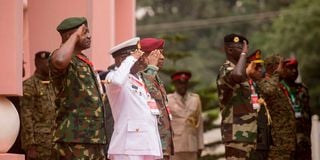Ecowas mission lands in coup-hit Niger for talks

Ghana's Chief of Defence Staff, Vice Admiral Seth Amoama welcomes Ivory Coast's Chief of Defence Staff Lassina Doumbia, during the Extraordinary meeting of the Economic Community of West African State (ECOWAS) Committee of chiefs of the defence staff in Accra, Ghana, on August 17, 2023.
Niamey, Niger
A delegation from West Africa's ECOWAS bloc arrived in Niger on Saturday seeking a peaceful rather than military solution after senior army officers seized power in a coup.
The delegation led by former Nigerian president Abdulsalami Abubakar flew into the capital early afternoon, a day after ECOWAS military chiefs announced they were ready to intervene to reinstate the ousted president.
The Economic Community of West African States (ECOWAS) has agreed to activate a "standby force" as a last resort to restore democracy in Niger after generals detained President Mohamed Bazoum on July 26.
But it says it favours dialogue to defuse the crisis.
A previous ECOWAS delegation headed by Abubakar on August 3 tried and failed to meet Bazoum and the coup leader, General Abdourahamane Tiani.
A source close to Saturday's delegation said it would send "a message of firmness" to the army officers and meet Bazoum.
He has been held with his family at the president's official residence since the coup, with growing international concern over his conditions in detention.
ECOWAS chair and Nigerian President Bola Tinubu on Friday threatened Niamey with "grave consequences" if the new regime allows Bazoum's health to worsen, an EU official said.
President will not be harmed
Niger's military-appointed prime minister, Ali Mahaman Lamine Zeine, told The New York Times that Bazoum would not be harmed.
"Nothing will happen to him, because we don't have a tradition of violence in Niger," the most senior civilian in the new regime told the daily.
Niger's new rulers have so far shown little flexibility and warned against an "illegal aggression".
Thousands of volunteers turned out in central Niamey on Saturday answering a call to register as civilian auxiliaries who could be mobilised to support the army.
ECOWAS defence chiefs had met this week in the Ghanaian capital Accra to fine-tune details of a potential military operation to restore Bazoum if ongoing negotiations with coup leaders fail.
"We are ready to go any time the order is given," Abdel-Fatau Musah, an ECOWAS commissioner for political affairs and security, said on Friday after the military chiefs' meeting.
"The D-Day is also decided."
ECOWAS leaders say they have to act after Niger became the fourth West African nation since 2020 to suffer a coup, following Mali, Guinea and Burkina Faso.
The Sahel region is struggling with growing jihadist insurgencies linked to Al-Qaeda and the Islamic State group. Frustration over the violence has in part prompted the military takeovers.
ECOWAS troops have intervened in other emergencies since 1990, including civil wars in Liberia and Sierra Leone. Ivory Coast, Benin and Nigeria are expected to contribute troops to a Niger mission.
Risky operation
But details of any Niger operation have not been released and analysts say intervention would be politically and militarily risky, especially for regional player Nigeria.
Nigeria is already struggling to contain violence from several armed groups at home, and leaders in the country's north have warned about spillover from Niger across the border if there is an intervention.
The coup leaders have defiantly threatened to charge Bazoum with treason. But they have also said they are open to talks.
The military-ruled governments in neighbouring Mali and Burkina Faso have also said an intervention in Niger would be seen as a declaration of war against them.
In the hours following the coup, France, which fields 1,500 troops in Niger, was asked to back a potential armed move to restore Bazoum to office, sources close to the affair told AFP, confirming a report in Le Monde daily.
"But the loyalists changed sides and joined the putschists. So the conditions were not right to meet the request for support," the source said.
ECOWAS has already applied trade and financial sanctions on Niger, while France, Germany and the United States have suspended aid programmes.





